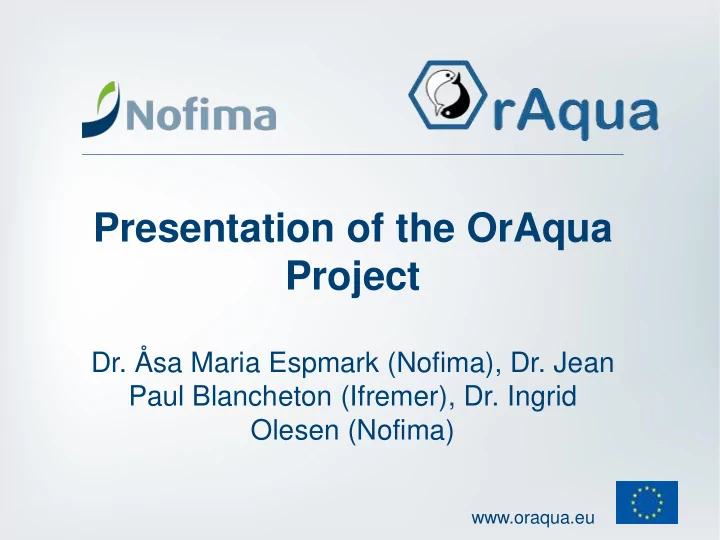

Presentation of the OrAqua Project Dr. Åsa Maria Espmark (Nofima), Dr. Jean Paul Blancheton (Ifremer), Dr. Ingrid Olesen (Nofima) www.oraqua.eu
OrAqua European Organic Aquaculture Science-based recommendations for further development of the EU regulatory framework and to underpin future growth in the sector www.oraqua.eu Coordination and support action 2014-2016 Project Coordinator: Ingrid Olesen (Year 1), Åsa Maria Espmark (Year 2 and 3) Espmark et al. EAS Rotterdam 2015
Overall objective Recommendations for a new EU organic regulation, - Based on the current scientific knowledge, - In line with the basic organic principles (principles of health, ecology, fairness and care), - Contributing to consumer confidence, to promote the growth of the organic aquaculture sector in Europe.
Evolution of the regulation Recommendations are elaborated by an expert group: Expert Group for Technical Advice on Organic Production (EGTOP) • First report in December 2013, • Second report in July 2014, • Several amendments since 2013. Proposition for a new regulation, • submitted by March 2014, • currently discussed at the EU parliament. End of the OrAqua project: December 2016.
The partners 1. Nofima, Norway 2. COISPA, Italy 3. DTU, Denmark 4. Ifremer, France 5. USB, Czech Republik 6. SLU, Sweden 7. DLO/IMARES, Netherlands 8. Debio Association, Norway 9. ICEA, Italy 10. ICROFS, Denmark 11. FEAP, Belgium 12. IZSVe, Italy 13. Culmarex SA, Spain
Organization of work packages Espmark et al. EAS Rotterdam 2015
Structure of the project: tools and information flows Espmark et al. EAS Rotterdam 2015
Where is OrAqua today? Gathering of scientific knowledge (completed reviews): • Production information – Feed and nutrition – Health, welfare, biosecurity and veterinary treatments – Production systems and their management – Interactions with the environment • Socio-economic information – Consumer perception and confidence issues – Competitiveness of organic products in the EU market – Analysis of institutional and regulation constraints – Analysis of socio-economic constraints Espmark et al. EAS Rotterdam 2015
Where is OrAqua today? Interactions with the society (Multi-stakeholder platform meetings): 1. Platform 1 – October 2014. In association with the meeting of the International Federation of Organic Agriculture Movements (Ifoam), Istanbul presentation of first bibliographic analysis and exchanges on – the project in general supporting the processes of reviewing (WP2 and 3) and – integration (WP4) with stakeholders interests and experiences 2. Platform 2 – October 2015 in association with the EAS meeting Rotterdam survey stakeholders values, attitudes and prioritize, and to – initiate the decision making process generated by MCDA (WP4) 3. Platform 3 – Mid 2016 Presentation and discussion of recommendations (WP6). – Espmark et al. EAS Rotterdam 2015
Concluding remarks 1. What is the issue at stake? Why does it matter? The fast growing European organic sector requires regulations – reinforcing its image (consumer confidence) and promoting its growth (improved profitability) Regulation has to be based on general organic principles, on – scientific information (aquaculture specific) and on SHs perception (MCDA survey), combining scientific information with consumer requirements 2. What are the main achievements, discoveries, technological breakthroughs? Production of science-based recommendations – Multi-stakeholder platform feed-backs for elaboration of a new EU – regulation on organic aquaculture co-constructed, well recognized and accepted by consumers Discovery – The need for an operating MSH group also after – OrAqua, to regularly pin-point important issues Espmark et al. EAS Rotterdam 2015
Concluding remarks 3. What impact and structural effect do you expect your project will generate (advancement of knowledge, technology, policy, environmental, socio-economics)? – The new regulation will combine Up-To-Date scientific information with consumer concerns, ensuring a well recognition of the organic label and maximizing the profitability of the sector – It will identify scientific and market knowledge gaps to be filled in through further studies – It is setting up a methodology for regular updating of the regulation, in order to make it more credible and safer (public confidence), which will result in a better profitability and underpin the growth of the organic sector Espmark et al. EAS Rotterdam 2015
Thank you for your attention Visit us at: www.oraqua.eu FP7-KBBE. 2013.1.2-11 Assessment of organic aquaculture for further development of European regulatory framework Coordinator: Åsa Maria Espmark. Funded by the EC (Grant No: 613547) www.oraqua.eu
Recommend
More recommend